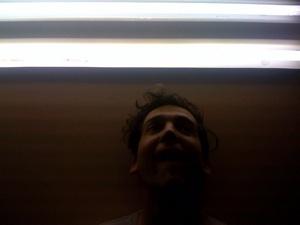
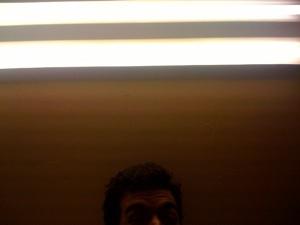
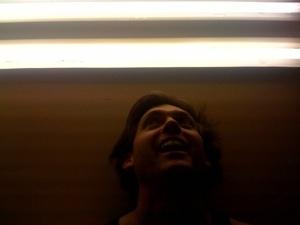
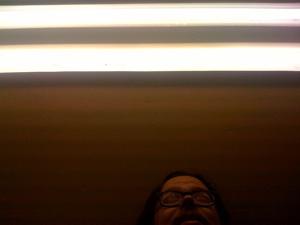
Peu avant Noël, nous avions reçu dans nos souliers, avec bonheur, le premier LP de Primary Structures, nouveau groupe tout droit sorti de San Francisco, ville décidément en pleine ébullition artistique. Réjouis par cet album tombé du ciel, comme on vous l’explique plus largement ici, il n’en fallait pas plus pour nous décider à poser quelques questions à Kyle Williams, chanteur et compositeur de la formation, histoire d’en savoir un peu plus sur ces mystérieux nouveaux venus…
Primary Structures est né des cendres de projets antérieurs. Pouvez-vous nous raconter votre rencontre et comment s’est créé ce nouveau groupe ?
Primary Structures finds its origins in the ashes of formers projects. Can you tell us how did the members meet each others and how was the band born?
Nous fréquentions tous les mêmes cercles artistiques et musicaux à San Francisco et Oakland. Jason et moi avons commencé à jouer ensemble en 2005, lorsque nous avons tous deux formé un projet nommé Volunteer Pioneer, avec Sabrina Duim, une harpiste très talentueuse. Elle était vraiment une star. Malheureusement, elle est décédée environ un an après nos débuts. Puis quelques temps plus tard, un nouveau groupe s’est formé, issu du cercle d’amis proches de Sabrina, qui tentaient tous de surmonter cette perte : moi, Jason, Matt et Ashley. A l’époque, Jason avait aussi demandé à son vieil ami Brian de nous rejoindre pour jouer de la basse.On avait appelé ce nouveau groupe Lady Genius. Puis Ashley s’est mariée et à déménagé. Jason, Matt, Brian et moi, on a alors décidé qu’on continuerait quand même à jouer ensemble, mais de manière différente, avec un son différent. On a donc aussi voulu changer de nom, et on s’est alors baptisés Primary Structures.
We were all in the same art and music circles in San Francisco and Oakland. Jason and I began playing together in 2005 when we formed a project called Volunteer Pioneer, which was the two of us and a talented harpist named Sabrina Duim. She was really a star. But, she unexpectedly passed away about a year after we began playing. Sometime after that, a band came together out of this group of friends that had been close to Sabrina and were all trying to deal with her loss — that was me, Jason, Matt and Ashley, and at that same time Jason asked his long-time friend Brian to join and play the bass. We called that band Lady Genius. Eventually, Ashley got married and moved away, so we were just down Jason, Matt, Brian and me. We decided we’d keep playing together, but played differently and sounded different, so we wanted to change the name and came up with Primary Structures.
Quelles sont les raisons du choix de ce nom ?
Primary Structures, why this name?
Primary Structures était le nom d’une exposition d’art datant de 1966, durant laquelle avaient étés présentés les travaux de sculpteurs minimalistes, comme Donald Judd, Carl Andre et Sol LeWitt. Ce nom nous est apparu très ouvert, dans le sens où il n’évoquait aucune image ou style de musique particuliers. On aimait aussi d’où ce nom venait : on est tous fans de ces artistes, et Jason et Brian font eux-mêmes des peintures minimalistes, tendance hard edge. C’est donc plutôt bien que notre nom soit en rapport avec une chose pour laquelle on éprouve tous de l’intérêt, sans que cela soit pour autant trop ostensible.
Primary Structures was the name of a 1966 art exhibit that showcased minimalist sculptors like Donald Judd, Carl Andre, and Sol LeWitt. To us, the name seemed open, like it didn’t evoke a particular image or style of music. We liked where it came from too; we are all fans of those artists — Jason and Brian both make minimal, hard-edge paintings themselves — so it’s nice that the name is connected to something we are all interested in without being too blunt about it.
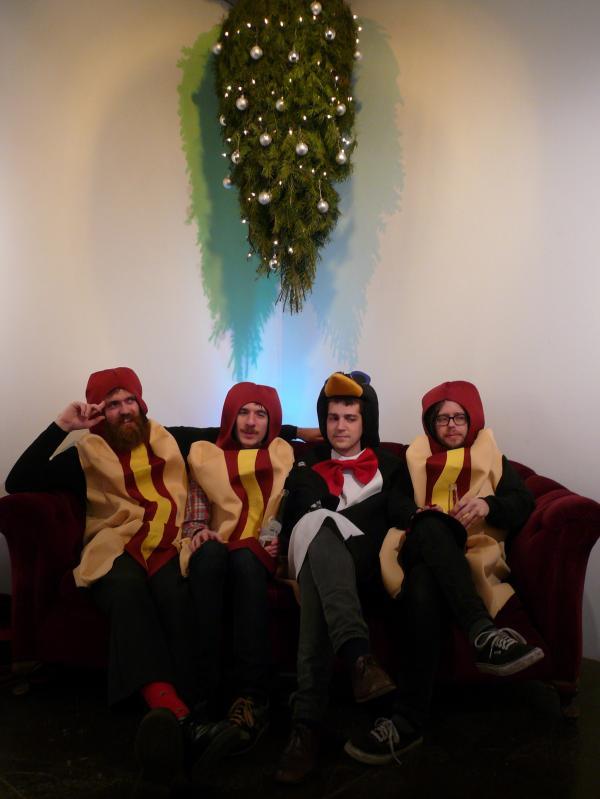
Pouvez-vous nous en dire plus sur la genèse de cet album ? De quelle manière composez-vous vos chansons ?
Can you tell us a bit more about the genesis of this album? How were your songs made?
J’écris les mélodies et les textes des chansons, avant de les présenter au groupe afin qu’on les travaille et qu’on les arrange ensemble. Jason s’occupe de la guitare, Brian de la basse, Matt de la batterie. Quant à moi, je chante, et joue du synthé sur quelques chansons. Quand nous étions encore cinq, nous avions enregistré un album avec le même tracklisting que l’actuel, mais on en n’était vraiment pas satisfait, et on a tout laissé de côté. Du coup, quand on a commencé Primary Structures, notre point de départ, c’était ça : un semblant d’album composé de chansons dont aucun de nous n’était satisfait. On a donc réécrit l’ensemble des titres, puis on les a enregistrés à San Francisco avec Jason Kick, un super ingénieur du son, avant qu’ils ne soient masterisés par un autre gars très talentueux, Paul Oldham, qui joue et écrit avec son frère Will Oldham au sein des Palace Brothers.
I write the melodies and lyrics for the songs, bring them to the group, and then we arrange them together. Jason plays guitar, brian: bass, matt: drums and I sing and play the synthesizer on a few songs. When we were a five-piece, we recorded an album with a similar list of songs but weren’t happy with how it turned out, and canned the whole thing. So when we began Primary Structures, that was our starting point – an album’s- worth of songs none of us were happy with. We re-wrote the songs, and then recorded them in San Francisco with a great engineer named Jason Kick, and had them mastered by another talented guy musician, Paul Oldham who plays with and records his brother Will Oldham of Palace Brothers.
Peu d’instruments sont présents sur votre premier album. Était-ce une volonté de votre part de composer vos titres sur la base d’une formation orchestrale réduite ?
There are few instruments on your first album. Was it a choice of yours to compose your songs on the basis of a reduced music group?
Oui, comme je l’ai dit, du temps de notre ancien line-up, les chansons avaient fini par être sur-écrites. Il y avait une seconde guitare, des claviers et du chant sur chaque chanson, et ce qui en ressortait était une sorte de millefeuille sonore, de pop orchestrale et émotionnelle, qui je pense nous plaisait à tous, sans pour autant vraiment correspondre au son que nous souhaitions avoir. Pour l’album, j’ai arrêté de jouer de la guitare, en me contentant d’ajouter un peu de synthé lorsque je pensais que cela apporterait réellement un plus. Jason, Matt et Brian, quant à eux, ont écrit une musique plus dépouillée, avec une vraie direction et plus intéressante que celle qui avait pu être la nôtre avant.
Yeah, as I was saying, with our old line-up the songs ended up being over-written. There was another guitar, keyboard and voice on every song, and the sound that came out was a kind of layered, emotive, orchestral pop sound that I think each of us liked, but didn’t really get what each of us really wanted for a sound. For this record, I quit playing guitar, and only added synthesizer where I thought it made a difference, and Jason Matt and Brian wrote music that was straighter, more driving and more interesting than what we’d come up with previously.
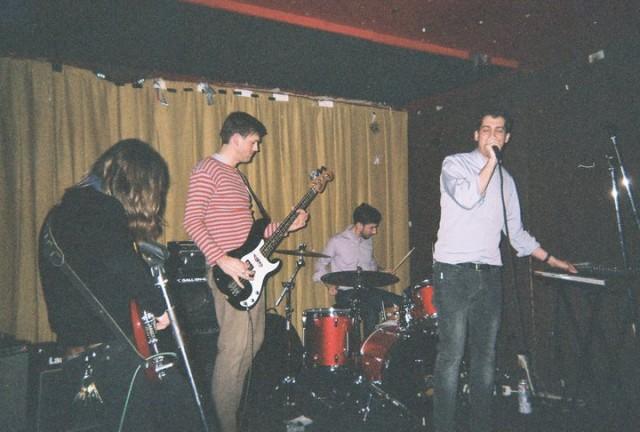
L’album apparait taillé pour la scène. Y pensiez-vous déjà en l’enregistrant ? Comment appréhendez vous l’exercice du live ?
The album sounds shaped for live shows. Did you have it in mind while recording it? How do you consider the stage experience of this album?
Je pense que c’est vrai. On souhaitait vraiment enregistrer une version propre et bien foutue de ce qu’on peut faire en live.
I think that’s right. We really just wanted to capture a clean, well-made version of what we could do in a live performance.
Lorsque l’on écoute cet album, il semble plus issu de la scène anglaise, voire new-yorkaise, que de celle de San Francisco. Votre ville a-t-elle une influence sur la musique que vous proposez ? Vous sentez-vous appartenir à une scène san franciscaine ?
As we listen to this album, it seems that it is rooted more in the British, or even New-Yorker stage than in the San Francisco one. Does your city influence your music in any ways? Do you feel like you belong to any San Francisco stage?
Personnellement, je n’ai pas ce sentiment d’appartenance. Il y a beaucoup d’excellents groupes issus de San Francisco en ce moment – je suis très fan de Grass Widow, ou The Fresh and Onlys- et parmi eux beaucoup d’artistes psych-garage qui font de la bonne musique et forment une vraie scène san franciscaine. Mais je ne pense pas pour autant qu’on partage les mêmes influences, ou alors si c’est le cas, ça ne nous mène pas au même résultat musicalement parlant.
Speaking personally, I don’t think so. There are a lot of excellent bands coming out of San Francisco now – I’m a big fan of Grass Widow and the Fresh and Onlys – and there a lot of other psych-garage acts that are making good music and forming a San Francisco scene, but I don’t think that we share the same influences, or if we do, do end up at the same place musically.
Votre musique semble baignée d’influences post-punk. Quelles sont-elles réellement et de quels autres groupes vous sentez-vous proches aujourd’hui ?
Your music seems bathing in post punk influences but what are trully your influences and to which bands do you feel close to musicwise?
Oui, c’est vrai qu’on a beaucoup d’influences post-punk, mais à nous quatre je crois que tous les goûts sont représentés. Je pense qu’on partage effectivement des influences, comme Pavement, The Smiths ou Talking Heads, qui ont pour particularité la capacité de pouvoir s’attacher à un songwriting solide, tout en continuant à composer des musiques simplement, comme un groupe peut le faire. J’aime particulièrement la façon dont ces artistes peuvent écrire des musiques et des mélodies magnifiques sans pour autant sonner trop popeux ou sentimentalistes (oui oui, même The Smiths, vraiment !). J’aime aussi la façon dont ils sont capables de transfigurer ces mélodies pour en arriver collectivement à un résultat noisy.
I think that’s correct, that we have a lot of post-punk influences, but between the four of us, I think we’re all over the place. I think we share influences, like Pavement, The Smiths, and Talking Heads that are about using the skills of a group to focus on strong songwriting, while still writing music like a band. I particularly appreciate how those bands could write really interesting, beautiful music and melodies without seeming too poppy or overly emotional (even The Smiths really). And how they’d be able put those melodies into noisy, collaborative arrangements.
L’album désormais sorti via Gold Robot Records, quels sont vos futurs projets ?
The album now out via Gold Robot Records, what are your plans for the future?
Les projets, c’est de continuer à jouer et composer, et puis passer cette nouvelle année à faire la promotion de l’album. On espère aussi mettre sur pieds une courte tournée en Europe à la fin de l’année.
Our plans are too keep playing and writing music, and to spend the year supporting the record. We’re hoping to plan a short tour in Europe by the end of the year.
Et que vas-tu faire, là, juste après cette interview ?
And what are you gonna do just after this interview?
J’aurais aimé avoir une réponse un peu plus sexy, mais là je suis sur le point d’aller chanter des classiques de Noël.
I wish I had a sexier answer, but I’m about to go Christmas caroling.
